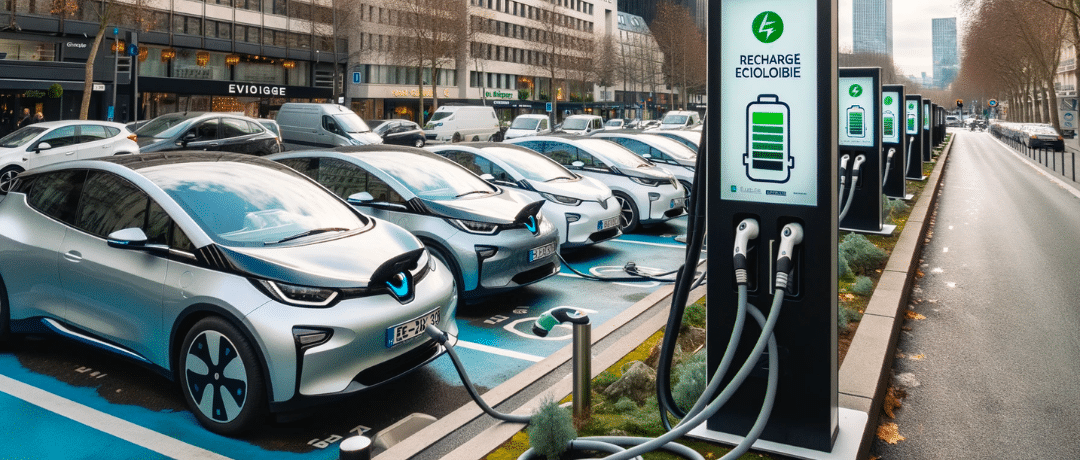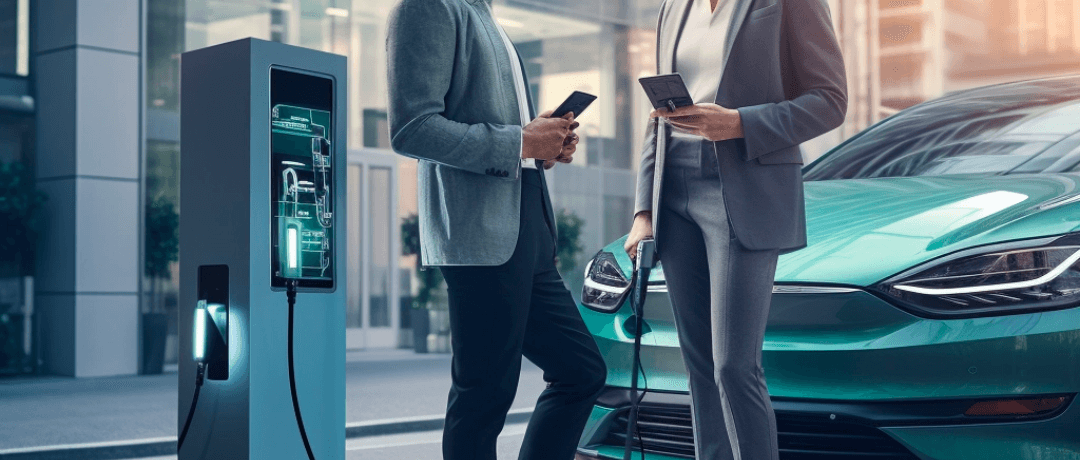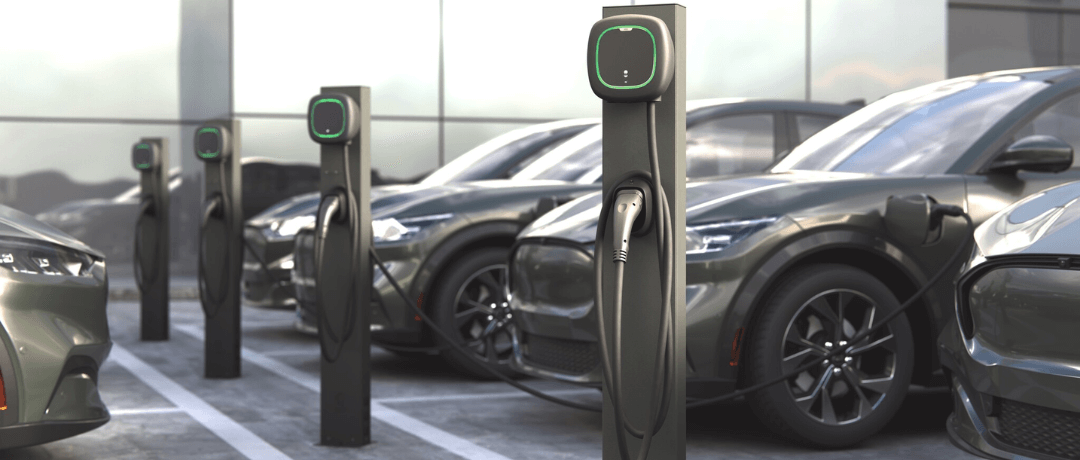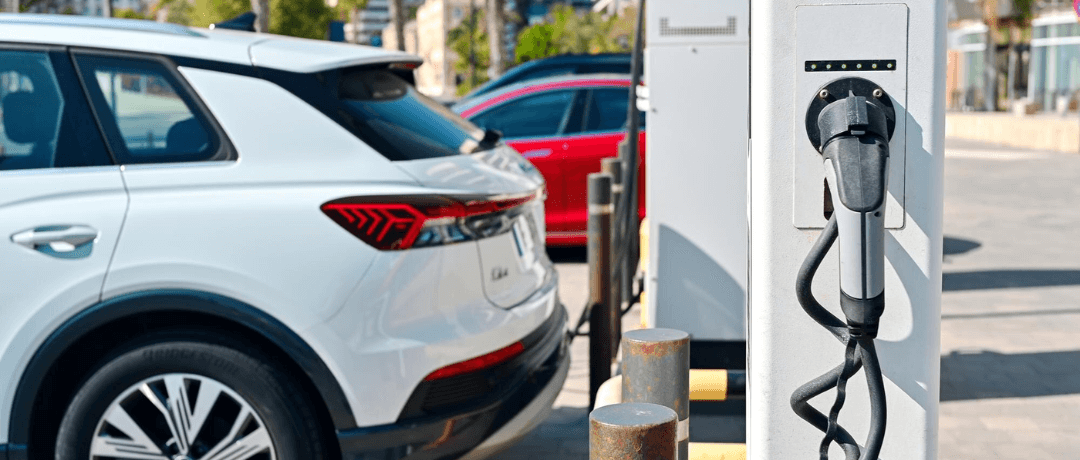Monday to Friday
9h 12h30 - 14h 19h
The obligation to electrify the company car fleet
The LOM lawor Mobility Orientation Act, introduces a major reform to modernize France's mobility policies, with a particular focus on sustainability andtransport accessibility.
The main objective is to redefine citizens' mobility in response to environmental challenges, aiming for carbon neutrality by 2050. The law provides for massive investment in transport infrastructure, and proposes key measures such as :
- upgrading existing networks,
- the introduction of low-emission zones,
- as well as the promotion of electric vehicles and alternative modes of transport.
It also encourages companies to adopt less polluting vehicles and encourages the use of bicycles and carpooling. In addition, the LOM provides for financial incentives for userssuch as :
- the 400 mobility package for carpooling or cycling,
- and discounts on tolls for alternative-fuel vehicles.
But that's not all: we are committed to :
- to promote autonomous shuttles,
- make driving licenses more accessible,
- and reduce the cost of car parts, while attacking the manufacturers' monopoly.
Read our article about :
Evolution of the mandatory percentage of electric vehicles in a company fleet
Find out more about the French Mobility Orientation Act (LOM), since 2022companies companies with more than 50 employees and a fleet of 100 vehicles or more must include clean vehicles when renewing their fleets.
The quotas imposed are gradually increasing:
- 10% by 2022,
- 20% by 2024,
- 40% in 2027,
- and 70% by 2030.
Companies must also install charging infrastructure in their parking lots, with specific depending on the size and age of the building.. Although there are as yet no penalties for non-compliance, anticipating these obligations offers financial and and improves the company's image.
For a successful transition, it is advisable to call on experts to optimize fleet management and comply with regulations, while maximizing economic and environmental benefits.
Read our article about :
Nevertheless, a study by Transport & Environment (T&E) reveals that almost 60% of French companies did not meet their fleet greening quotas by 2023.. As mentioned above, legislation imposes strict obligations on companies with over 50 employees to integrate a certain percentage of low-emission vehicles into their fleets. However, many many companies are struggling to meet these targetsdespite the financial penalties available to those who fail to comply.
As a result, a new new bill aims to reinforce these quotas and exclude plug-in hybrid vehicles from the calculationsThis will force companies to switch to fully electric or hydrogen-powered vehicles.
The reforms underway, including an ecological bonus for commercial vehiclesare designed to further encourage companies to adopt electric fleets electric fleets. The financial benefits are significant:
- tax exemptions,
- environmental benefits,
- improving brand image,
- as well as savings on fuel and maintenance costs,
As a result, the European Union is also pushing companies to comply with the new sustainability standards, on pain of sanctions. Recalcitrant recalcitrant companies risk fines and reputational damageThis is a major issue at a time when transparency and sustainability have become essential criteria for consumers and investors.
Read our article about :
The electric car is gradually becoming a must-have option for businesses, thanks to its low total cost of ownership (TCO), which is now than that of combustion-powered vehicles. This trend is reinforced by savings on energy, taxes and maintenance.
What's more, fleet electrification plays a crucial role in reducing carbon emissions, while promoting the second-hand market through rapid vehicle resale.
Faced with the urgency of climate change, France plans to accelerate this transition, notably through a proposal for a law to green corporate fleets as briefly mentioned above.
This legislation, introduced by MP Damien Adam, aims to strengthen existing regulations to encourage the adoption of electric vehicles in companies. The transport sector, France's biggest emitter of greenhouse gases, is at the heart of this initiative. Despite the ambitious targets set by the Stratégie Nationale Bas Carbone, more stringent action is needed to significantly reduce emissions by 2030.
Damien Adam's bill, although controversial, introduces progressive progressive electrification quotas for fleets and provides for financial penalties for companies that fail to meet these obligations. Adjustments have been proposed, notably concerning the electrification timetable and fines, in order to reconcile ecological imperatives with the operational realities of companies.
Key measures include the integration of theeco-score as a selection criterion for electric vehicles, and the of retrofitted vehicles illustrate this willingness to adapt. In addition, specific provisions for short-term rental and car-sharingcar-sharingwith a revision scheduled for 2027.
Read our article about :
At the same time, the French government is stepping up its strategy to promote sustainable mobility, particularly among businesses, which account for companies, which account for over 50% of annual new vehicle registrations.
Visit Finance Bill 2024adopted on December 21, 2023, introduces major changes in automotive taxation, focusing on three main areas, which we will detail below:
- the restriction of the ecological bonus,
- visit tightening of the "malus écologique,
- and the revision of annual taxes on CO2 emissions and pollutants.
These tax adjustments are clearly aimed at encouraging companies to opt for greener fleets, while considerably increasing the financial burden for those who persist in using polluting vehicles.
These measures, designed as levers to accelerate the energy transition, transform automobile taxation into a powerful tool for promoting sustainable mobility.
Read our article about :
The advantages of electric vehicles for business
The rise of electric vehicles in the automotive market is undeniable, with a growing share of sales for both private and commercial customers.
By the end of 2022, almost 16% of company cars were electricunderlining the importance for professionals to consider this transition.
In addition to their environmental benefits, electric vehicles :
- reduce noise pollution,
- offer superior superior driving comfort,
- and enhance the company's corporate social responsibility (CSR) IMAGE.
In economic terms, although the initial investment is high, the long-term long-term savings are substantial. The The cost of recharging is significantly than fossil fuels, and maintenance is lessmaintenance is less complex and costly. Electric vehicles have fewer mechanical parts, which reduces the frequency frequency and cost of maintenance.
The legislative and fiscal environment is also favorable, with incentives incentives such as the conversion bonus and the Advenirbonus, which can considerably reduce the purchase cost. In addition, companies can benefit from tax exemptions, such as :
- l'exemption from vehicle registration tax,
- and the abolition of the Company Vehicle Tax (TVS).
In terms ofrange, today's electric vehicles offer performance levels suitable for business tripsparticularly in urban environments. Last but not least, technological advances are simplifying recharging, with systems such as "Plug & Charge". Plug & Charge "and and increasingly rapid recharging times..
Read our article about :
In addition to these benefits, we have thebenefit in kindwhich is a tax mechanism enabling employers to provide various services or benefits to their employeessuch as the provision of a company car.
This scheme specifically concerns vehicles that employees may use for both professional and personal reasons. Unlike company cars, which are used solely for business purposes, company cars offer a tax advantage for the employer, as well as being an asset for :
- attract,
- loyalty,
- and motivate employees.
The adoption of company electric vehicles offers even more attractive tax advantages than combustion vehicles, thanks in particular to tax exemptions and specific tax allowances.
For example, the cost of electricity for recharging vehicles is not taken into account when calculating the benefit in kind, and a 50% deduction may be applied up to a 1,800 per year.
The calculation of this benefit depends on whether the vehicle is purchased or leased by the company.
In the case of a purchasethe benefit represents a percentage of the vehicle purchase costwhereas for a leasingit amounts to 30% of the total annual cost. These conditions make the company electric vehicle particularly attractiveboth for the employer, who reduces his social security contributions, and for the employee, who benefits from a significant tax advantage.
Read our article about :
Similarly, the VATor Value-Added Tax, is a consumption tax introduced in France in 1954 to simplify the tax system.. Unlike previous taxes, it is applied applied uniformly to the final consumerregardless of the number of intermediaries involved. Each company involved in the production of a good collects the VAT from its customers and passes it on to the State after deduction of the VAT paid to its own suppliers.
However, in the business world VAT recovery on company cars is limited.. For private vehicles for business usethe VAT is generally not recoverableregardless of the method of purchase.
However, as far as electric cars are concerned VAT on electricity is fully recoverable. In addition, companies benefit fromadditional tax benefitssuch as :
- l'exemption from vehicle registration fees,
- an advantageousamortization base of €30,000,
and theexemption from the Taxe sur les Véhicules de Société (TVS).
Read our article about :
Naturally, leasing leasing an electric car is a strategic option for companies wishing to reduce their carbon footprint while optimizing their costs.
The long-term leasing (LLD) for professionals is particularly popularbecause it enables companies to benefit from a modern fleet of vehicles without tying up large amounts of capital.
This financing method offers flexibility and tax advantagesincluding the deduction of rental income from taxable income, while avoiding the risks associated with maintenance and repairs.
The Lease to Own (LOA) offers you the opportunity toopportunity to buy back the vehicle at the end of the contractoffering a flexible alternative for companies.
Finally, the possibility of to rent charging stations allows companies :
- stabilize their budgets,
- and maintenance services,
making the transition to electric both sustainable and economically viable. Electric car leasing is thus emerging as a global solution for companies seeking to combine performance, savings and environmental responsibility.
Read our article about :
To go further in the field of leasing, and more specifically in that of long-term leasing, the depreciation of vehicles on long-term leases can seem complex.depreciation of long-term leased vehicles can seem complex.. However, it is essential for companies planning to lease electric cars.
When a company acquires a vehicle, it is recorded as a fixed asset on the balance sheet. entered on the assets side of the balance sheet as a fixed assetand its depreciation is tax-deductibleexcept in certain specific cases linked to CO2 emissions.
For leased passenger carsa annual depreciation ceiling is appliedinfluenced by the vehicle's CO2 emissions. For example, vehicles vehicles emitting more than 155g/km of CO2 are subject to a very strict depreciation ceiling.. In addition, the Code Général des Impôts imposes a limit on the deductibility of depreciation when the purchase price exceeds €18,300.. The calculation of non-deductible depreciation is then based on the financial value of the vehicle, spread over the depreciation period.
With regard to electric commercial vehiclescompanies can reclaim VAT on leases and fuelwhich is not the case for passenger cars..
Electric and hybrid vehicles benefit from numerous tax incentives, such as exemption from the tax on the use of passenger vehicles for economic purposes, making them even more attractive from an accounting point of view.
Read our article about :
Tesla Model 3 Performance
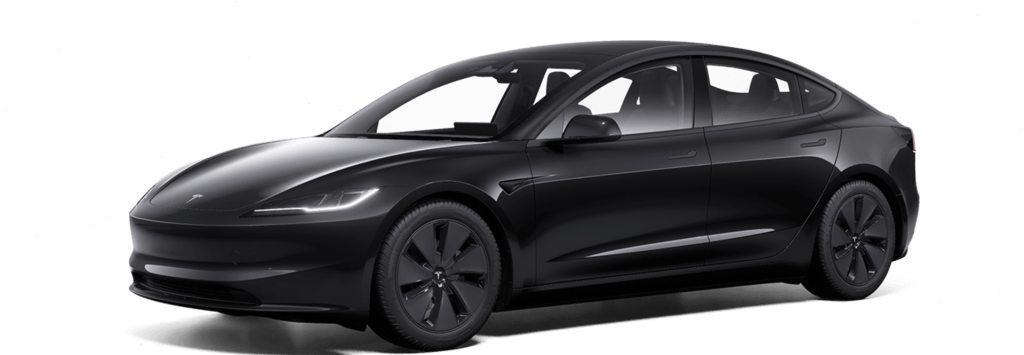
Purchase price €57,490
(list price excluding bonus)
LLD sans apport pour les professionnels à partir de 836 € / mois
- Range (WLTP): 528 km
- Acceleration (0 to 100 km/h): 3.1 sec
- Fast charge (from 20% to 80%): 20 min.
Peugeot e-308 54 kWh

Purchase price €43,900
(list price excluding bonus)
Low-cost leasing for professionals from €498 / month
- Autonomie ( WLTP) : 409 km
- Acceleration (0 to 100 km/h): 9 sec.
- Fast charge (from 20% to 80%): 23 min.
Professionals: subsidies for the purchase of electric vehicles
The ecological bonus is a financial incentive to encourage the purchase of vehicles with a reduced carbon footprint, whether new or used.
At 2024significant adjustments were made to this scheme as part of France's ongoing effort to promote greener mobility choices. The eligibility criteria have evolvedeliminating the notion of mass to focus on a more comprehensive assessment of vehicles' environmental impact, including :
- routing,
- the materials used,
- and CO2 emissions.
For 2024, the amount of the bonus has been modified. companies and municipalities no longer benefit from this aid for private vehiclesand the and used vehicles have also been reduced.. In addition used electric cars are no longer eligible for a bonus for a bonus, but leasing for private customers will benefit from increased assistance.
The light electric vehicles and quadricycles continue to benefit from specific bonusesElectric retrofits (i.e. the conversion of combustion engine vehicles into electric ones) continue to be supported under certain conditions.
The procedures for obtaining the ecological bonus have not changed: it can be deducted directly by the dealer or requested at a later date from theAgence de services et de paiement.
Read our article about :
At the same time, the malus écologique in France underwent major changes to encourage the adoption of more environmentally-friendly vehicles.
The threshold has been lowered to 118 g/km of CO2resulting in a 50 euros for vehicles exceeding this limit..
This reduced threshold means that more vehicles will be covered by the tax, thus strengthening incentives to choose less polluting models. The malus ceiling is now €60,000applicable to vehicles emitting 194 g/km of CO2 or more.
In addition, the weight maluswhich which penalizes vehicles weighing over 1,600 kgis intensified.
This measure aims to encourage the production of lighter, less polluting and therefore less polluting, despite criticism of its impact on family and commercial vehicles.
Read our article about :
Despite the abolition of this subsidy, the conversion premium remains in place. aid for companies considering the acquisition of a new or used electric or plug-in hybrid vehicle.. It can provide up to €3,000 for companieswith specific amounts for professionals interested in :
- 2 or 3-wheeled vehicles,
- or electric quadricycles.
And don't forget that there are several grants available for the acquisition of one or more charging stations, as well as several regional grants.
Read our article about :
For further details, we have, for example, the Île-de-France region which subsidizes the purchase of electric cars and retrofit to encourage pollution reduction, providing support for small local businesses.
This regional aid, available to companies with fewer than 50 employeesis subject to a maximum purchase price of €47,000 for electric vehicles assembled in the EU or complying with certain environmental standards.
The amount of assistance varies according to the type of vehicle, ranging from 1,500 for two-wheelers à 9,000 for electric trucks.
A of €15,000 is also available for new craft or commercial businesses under certain conditions. In additionretrofit assistance to convert combustion engine vehicles into clean vehicles, with grants ranging from 500 € à 3 000 €depending on the type of vehicle.
Finally, the Auvergne-Rhône-Alpes region supports the purchase of electric vehicles with specific grants, accompanied by conditions of commitment for beneficiaries. However, this aid is only available to :
- SME/TPE,
- companies,
- communities,
- liberal professions,
- public institutions,
- independent resellers,
- and associations.
Each program requires specific administrative procedureswith online or by post, depending on the region concerned.depending on the region concerned. These grants can be combined under certain conditions, offering an interesting opportunity for professionals wishing to adopt more environmentally-friendly vehicles.
Read our article about :
Corporate taxation and electric vehicles: tips and tricks
Although the initial investment in electric vehicles is generally higher than for internal combustion vehicles, they offer substantial fuel savings. substantial savings in terms of fuel and tax tax advantages.
Electric vehicles also offer lower depreciation lower depreciation and lower lower maintenance costswhich can reduce overall TCO.
Total Cost of Ownership (TCO), or Total Cost of Ownership, is a crucial measure for companies in order toevaluate the full cost of their assetsincluding electric vehicles.
Introduced by the consulting firm Gartner Group in 1987 to reduce IT expenditure, TCO also applies to car fleets. It encompasses all associated with a vehicle over a given periodusually 5 years.
These fees include :
- maintenance,
- fuel,
- initial capital,
- depreciation,
- insurance,
- and administrative costs.
To calculate TCO accurately, it's essential to take several parameters into account.
The depreciation represents approximately 40% of TCOas the value of the vehicle diminishes over time. Fuel costs represent about 20%, depending on various factors such as :
- the refill price,
- vehicle condition,
- and driving style.
L'insurancewhich can account for 10 to 15% of the TCOvaries according to the type of coverage type vehicle characteristics.
Finally, maintenance maintenance costsrepresenting around 5 to 10%increase over the years, influencing the overall cost of ownership.
So choosing the right vehicles and optimizing TCO calculations are essential to maximize savings and invest intelligently in your fleet.
Read our article about :
In the same vein, to keep costs under control, it is important to choose an electrical model tailored to your company's specific needs.
If your frequent travelopt for a with good autonomy.
On the other hand, for urban journeysurban electric city car will be more appropriate. The recharging speed is also a key factordirectly influencing the efficiency of your operations.
Plus.., plan your trips and adapt your driving style are effective strategies for :
- optimize autonomy,
- and reduce energy costs.
As a company, it is also advisable to raise awareness and and train your employees in eco-driving and theuse of charging stations. Last but not least install charging stations or at employees' homes can be an advantageous solution for minimizing minimizing charging costs.
Use the TCO simulator to calculate your car's total cost of ownership and compare it with its internal combustion equivalent.
Read our article about :
First and foremost, installing charging stations in the workplace has become a necessity for many for many companies, not only to meet growing employee demand, but also to improve employee satisfaction. Offering this service enables employees to :
- save time,
- reduce their stress,
- strengthen the company's attractiveness and its corporate social responsibility policy.
However, this investment can be costlywith up to several thousand euros, depending on the depending on the installation and associated services.
To recoup these costs, companies can choose to charge their employees for recharging, whether :
- per kWh,
- to time,
- or as a package.
Each method has its own advantages, depending on the company's needs. The connected charging stations also offer advanced functionalitiessuch as remote supervision andbilling automationmaking day-to-day management easier.
Read our article about :
Secondly, there are mileage allowancesbeing a financial compensation paid by the company to an employee who uses his or her personal vehicle for business purposes. Unlike company vehicles, these allowances apply exclusively to employees' private vehicles. employees' private vehicles.
This compensation covers costs such as :
- wear and tear,
- maintenance,
- insurance,
- and electricity consumption for electric vehicles.
However, it excludes :
- tolls,
- loan interest,
- and parking fees,
For electric vehicles, an additional of 20% is applied to the standard to the standard kilometric scale, making compensationmore advantageous.
In addition can be deducted from taxable income in two ways via two methods:
- the 10% standard deduction
- or the deduction of actual expenses, the latter requiring proof of expenditure.
The mileage scalewhich has been increased by 5.4% in 2024takes into accountinflation and the rising fuel costs. For electric vehicles, this scale already takes into account battery costsmaking them a financially advantageous option for professionals.
Read our article about :
Benefits of purchasing electric vehicles, by type of company
Liberal professions
For self-employed self-employed professionalsthe acquisition of an electric car offers significant significant tax advantages. Recent tax changes, notably the the abolition of the ecological bonus for companies and thefor private individualsare also factors to be taken into account.
However, self-employed professionals can take advantage of :
- of the conversion premium,
- up to up to €6,000 for low-income households,
- and benefit fromadditional aid in Low Emission Zones (ZFE).
As a reminder, when it comes to tax deductions, professionals can choose between two methods:
- visit actual,
- or mileage allowances.
Kilometric allowances cover a wide range of expenses, including depreciation, maintenance and electricity.
For actual actual costsit is necessary necessary to keep all invoicesbut this method can be more complex in the case of mixed use of the vehicle.
All in all, the purchase of an electric vehicle for a self-employed business is a tax-optimized choice.
Read our article about :
Indeed, the French government actively encourages liberal professionals to adopt electric vehicles, offering several tax advantages.
Among these advantages, depreciation allows a tax deduction of up to €30,000 for vehicles emitting less than 20 g of CO₂/km. It is also possible todepreciate the battery separately. In terms of vehicle registration, some regions grant total exemption from registration tax for electric cars.
In addition professionals are exempt from the company vehicle taxnow replaced by taxes on pollutant emissions.
Read our article about :
Tourism-related professions
The passenger transport sector, which is expanding rapidly with the growing popularity of matchmaking applications, encompasses various professions such as :
- the cabs,
- the VTC drivers,
- and capacity LOTI.
Passenger transport companies benefit from specific tax advantages.
They can recover VAT on the purchase of their vehicleswhether they are purchased outright, leased or rented. In addition, these companies are exempt from the tax on the use of passenger vehicles provided the vehicles are used exclusively for passenger transport. With regard to depreciation vehicles can be depreciated over 4 to 5 yearswith cabs can be depreciated over 3 years.
Read our article about :
Small and medium-sized businesses
For SMEs and VSEsthe leasing offers several major advantages.
From a tax point of view, electric vehicles :
- benefit fromexemptions from the Taxe sur les Véhicules de Sociétés (TVS)
- and allow you toincrease deductible expensesthus optimizing corporate tax.
In addition, long-term leasing facilitates better cash flow management thanks to fixed monthly payments that simplify budget forecasting.
Leasing also offers contractual flexibilityallowing the contract to be adapted to the changing needs of the company, such as the mileage or the services included. What's more, it guarantees a vehicle that is always up to date and efficient, contributing to the company's brand image and employee satisfaction.
In terms of financial support, the French government offers various schemes, such as the conversion premium, which can be combined with local aid to reduce the cost of electric vehicles.
But that's not all: the ADEME Green Loanin collaboration with Bpifrance, is also available to help SMEs and VSEs finance their energy transition on advantageous terms.
Finally, to complete the energy transition, companies can consider installing charging stations and distributing recharging cards to their employees, thus facilitating the use of electric vehicles.
Read our article about :
Would you like to order your Beev recharge card ?
Our card makes it easy to recharge your electric car at any charging station in Europe.
Did you know? The adoption ofelectric vans offers numerous advantages for SMEsbeyond simply reducing fuel and maintenance costs.
These vehicles offer significant savings thanks to :
- simplified management of operating costs,
- and a significant reduction in maintenance costs, with costs up to 25% lower than those of combustion engines.
The electric utility market is expanding, with a growing range of models adapted to the specific needs of SMEs, such as :
- the Renault Kangoo e-Tech for transporting equipment
- or the Peugeot e-Expert for last-mile delivery.
Acquiring or leasing these vehicles also enables you to benefit from tax advantages such as recovery of VAT and advantageous depreciationwhile reducing the company's carbon footprint.
To take full advantage of these benefits, it is crucial tooptimize the management of your electric fleet taking into account :
- independently,
- associated costs,
- and useful vehicle volume.
When it comes to recharge management, SMEs have several options:
- use of household adapters,
- installation of internal charging stations,
- or membership of public recharging networks,
Each solution offers specific advantages, depending on the company's needs and resources.
By gradually adopting electric vans, your SME will not only be able to reduce its operating costsbut also improve its brand image by positioning itself as a responsible player in the energy transition.
Read our article about :
Conclusion
The taxation of electric cars in the workplace represents an area rich in opportunities and advantages for discerning professionals.. By taking advantage of available subsidies, tax breaks and amortization mechanisms, companies can not only reduce their operating costs and boost their ROI, but also play an active role in the energy transition.
Keeping abreast of legislative developments and tax opportunities is essential to maximizing the benefits of your transition to an electric vehicle fleet. By investing time in a thorough understanding of these aspects, you can both optimize both your management and your investments, while making make a positive contribution to the environment and strengthen your brand image.
Are you convinced of the benefits of electric vehicles for your company and looking for a reliable partner to help you make the transition? Beev is the solution you need! Contact our experts today to get a free quote and discover our tailor-made offers.
Over 2,000 customers have placed their trust in us
Conseils et processus de commande au top. Une équipe pour l'installation super et serviable.
Société compétente et très professionnelle, je recommande vivement!!!!
Un grand merci à Léo qui n'a pas ménagé ses efforts malgré les contraintes pour trouver le meilleur financement et LE véhicule que je souhaitais dans des délais courts.
Bonjour l'équipe Beev, J'ai pas grand chose à dire, mais juste waouh, service impeccable et je tiens à remercier en particulier Mr Léo CHAPUT pour son professionnalisme. je recommande sans hésitation.
Excellent contact avec le représentant commercial, livraison ultra rapide et installation réalisée telle que prévue par une équipe compétente. La borne fonctionne parfaitement, que demander de plus ?
Guten Morgen Herr Mehaoucha Die Installation ist abgeschlossen und alles funktioniert einwandfrei.👍👍☺️ Ich möchte mich noch einmal für Ihren persönlichen Einsatz bestens bedanken. Ich arbeite selber im Dienstleistungssektor und weiss genau was Kundenservice, rasche Bearbeitung und Freundlichkeit bedeuten. All das haben Sie mit Bravour erfüllt.👍Mein Kompliment (auch an das BEEV-Team). Ich kann BEEV nur weiterempfehlen. Alles TOP































